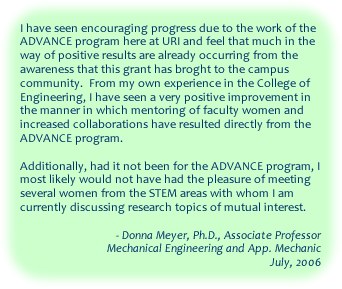Climate Change at the University of Rhode Island
Executive Summary
NSF ADVANCE PI Meeting, May 19-20, 2005
Janett Trubatch, (former) PI
The URI ADVANCE Institutional Transformation Award has made a number of investments and created or expanded upon a number of programs that have been successful in changing the climate at URI.
The most significant of these is what started out as the Pre-Faculty Fellows Program and morphed into the ADVANCE Assistant Professor Program. Our initial goal was to hire 4 women faculty, one in each of 4 Colleges with STEM departments. Each position was designed to provide a decreased teaching load, a variety of support and mentoring programs, and a transition to a regular tenure track faculty position at the completion of ADVANCE support. The response to advertising these positions was so overwhelming that Deans of all 4 colleges raised additional funds to make 2 new hires in each college. The Deans and faculty involved in these searches were amazed at the large pools of superiorly qualified women candidates generated in each field. We learned an important lesson from this, and other recruitment processes over the past years, that provisions for dual-career offers are increasingly important in faculty hires.
The other major effort we undertook was to use the Prochaska Transtheoretical Model for Behavior Change to both manage and measure climate change. We used a trainer to work directly with faculty in departmental workshops to (1) plan and implement projects to improve work life and (2) create opportunities for all faculty to successfully balance work and family obligations.

The NSF ADVANCE program’s goal of institutional transformation relies on, and is evidenced by, overarching climate change which is brought about through significant and positive changes in the working environment and working conditions for women and underrepresented faculty, to the ultimate benefit of all faculty.
All of the URI ADVANCE program initiatives, either proximally or distally, strive to produce climate change. Initiatives that help in this endeavor include (1) increasing the representation of women faculty and educating about best practices in recruitment; (2) increasing faculty and administration awareness about climate issues, subtle forms of bias, and the importance of faculty diversity; (3) promoting effective mentoring; (4) promoting social and professional collaborations; and (5) institutionalizing supportive work-life policies.
Other specific ADVANCE initiatives that focus on improving work climate include:
Evidence of climate change is being seen in many places. Anecdotal reports, such as the comment above, are numerous. Gathering qualitative and quantitative data on climate change will be a major focus in the final years of the ADVANCE project.
We welcome your input. Please contact the ADVANCE office if you can offer anecdotal evidence of your own!
 URI Homepage
URI Homepage






